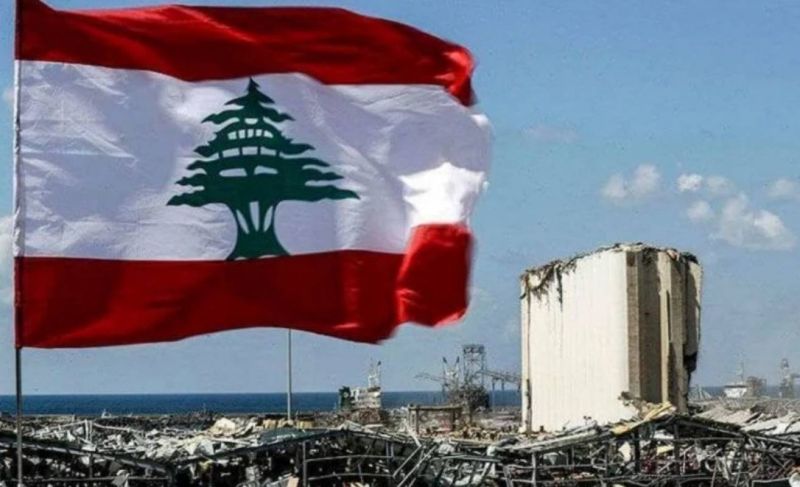
Lebanese flag flies near the port of Beirut, 2020. (Credit: Archive photo Joseph Eid/AFP)
During a time of profound upheavals in the Middle East and the world, Lebanon is merely an observer. Gone are Lebanon’s days of geopolitical significance. Today, Lebanon resembles an island, isolated from the world stage and pushed to its sidelines.
The trade corridor project that US President Joe Biden announced last week at the G20 summit in New Delhi illustrates this reality. Its route links India, the Middle East and Europe, bypassing Beirut’s port. The mega logistics corridor project makes Haifa in Israel the new “gate of the orient.”
Beirut, Alexandria and Istanbul
Beirut’s port was developed in the 19th century, when Europe was trying to control international trade under the banner of free trade. At the time, the Ottoman Empire sought European help to modernize its ports.
Mount Lebanon’s episodes of instability in 1840 and 1860 gave European powers its chance to consolidate influence in Ottoman territory.
Mount Lebanon was beginning to adopt an agro-industrial economic model based on silk production, which became the cornerstone of a solid trade relationship with Europe. Silk export to Marseille and Lyon drew the interest of European powers to the port of Beirut.
The Lebanese bourgeoisie sought to represent major trade agencies.became increasingly necessary for Europeans to have direct economic and political representation on the Ottoman coast.
Beirut became the headquarters of chancelleries of the great powers, alongside Alexandria and Istanbul.
Consulates took on an increasingly important economic and political role. This was particularly the case after Napoleon’s defeat in Egypt. Paris began to look for alternative routes to the heart of the Orient. Beirut stood out for its strategic position.
A century later, Beirut’s importance continued to grow, particularly after the Nakba in 1948 and the creation of the State of Israel.
Boycotted by the Arabs, the port of Haifa gave way for Beirut to become the new gate of the Orient. Lebanon became a prototype for its neighbors in the Arab world, who sought to politically position themselves on the regional chessboard
The country achieved this position thanks to its cultural industry, its education system, the openness of its society, its human capacity, its advanced constitutional model and its “soft power.” Attracting capital and tourism, it became important to Saudi Arabia and other regional players.
Haifa takes its revenge
Sectarian conflict and self-interest has destroyed Lebanon’s competitive edge.
The Gulf countries that once ran to save Lebanon are now turning their gaze elsewhere. With some Lebanese factions going so far as using their financial aid against them, they feel that everything they offered Lebanon was in vain.
In light of the improved relations between the Gulf States and Israel, this gloomy view of Lebanon continues. Israel seeks to usurp Lebanon’s role as the hub for medical services, tourism, education and culture, for Arabs.
Within this context, Israel seeks to regain, strengthen and extend the role of the port of Haifa at the expense of the port of Beirut. After the destruction of the Beirut port on Aug. 4 2020, Haifa’s modern, well-equipped port thrived.
The financial role that Lebanon once played has come to an end. Capital and investments are now going elsewhere in the Middle East.
It has to be admitted: Lebanon has lost the “historical role” which many countries are seeking to inherit. This new reality is at odds with the nature and identity of the country that has been historically and traditionally close to the West.
Lebanon now finds itself prey to successive crises similar to those in Syria and Iraq —a proxy for outside wars. It is hardly surprising that Joe Biden’s newly announced project excludes Lebanon, along with Syria and Iraq, while Israel remains the “pearl in its crown.”
The new route starts in India, passes through the United Arab Emirates, Saudi Arabia and Jordan, and leads to the port of Haifa, where it continues to Greece and the rest of Europe.
The project aims to link these countries by rail, sea, pipeline and high-speed cable. It competes with the Silk Road initiative, which runs from China to Pakistan, Kuwait, Oman, then on to Africa. Even the Gaza Strip is a partner in this project and could benefit from it.
Meanwhile, Lebanon is only remembered when there is talk about “Israel's security.” Or how to bring it back into the Western fold — a process that seems increasingly complicated.
Today, Israel’s security is threatened by clashes in Ain al-Hilweh, a Palestinian refugee camp in Lebanon. The clashes seek to eliminate the “official Palestinian force” represented by Fatah in favor of Islamist groups.
This comes at a critical time when international negotiations, instigated by the US, are taking place with the Palestinian Authority on new normalization agreements, notably between Saudi Arabia and Israel.
Today, Lebanon seems to be at a crossroads between two routes: the Chinese Silk Road, and the new American route. Lebanon's presidential vacuum is not separate from this reality. Hezbollah and Amal, who both favor Sleiman Frangieh, support the Silk Road.
Meanwhile, those opposing Frangieh, support the American corridor. A faltering French initiative is right in the middle of the two. Which road will Lebanon take?
This article was originally published in French in L'Orient-Le Jour. Translation by Joelle El Khoury.